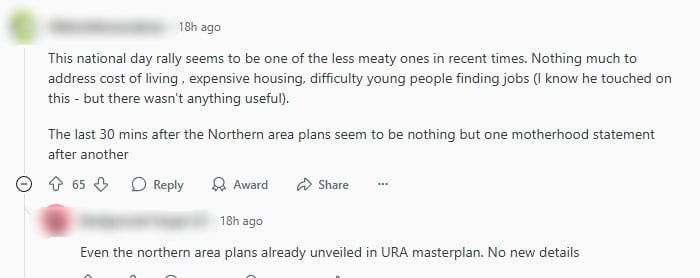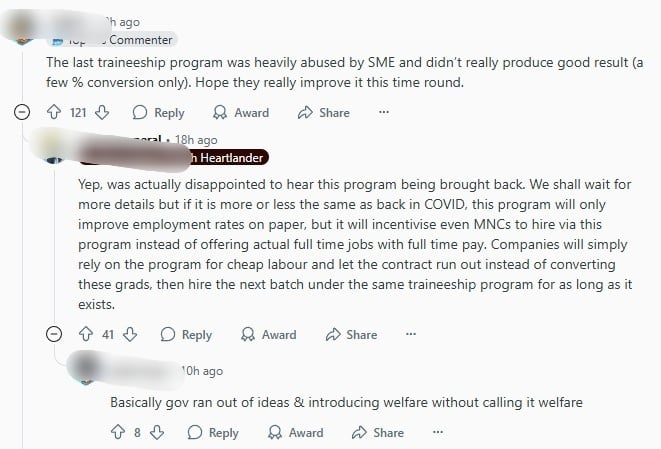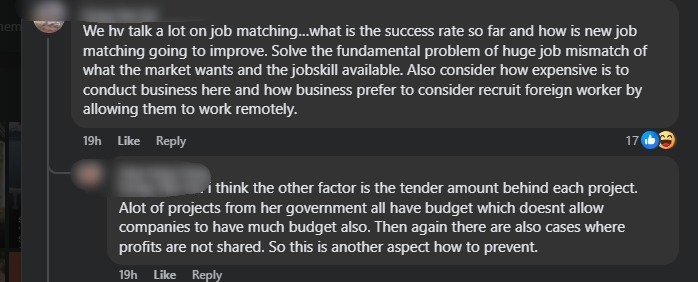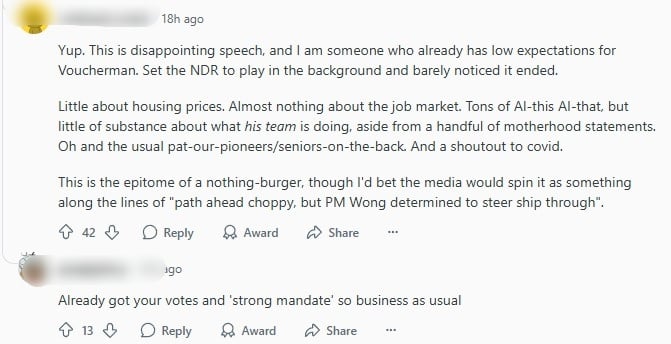On 17 August, 2025, Prime Minister Lawrence Wong delivered his second National Day Rally (NDR) since taking office and securing a stronger mandate in the General Election earlier this year.
In his address, Wong outlined measures to support Singaporeans across different life stages.
He emphasised jobs, senior care, and youth protection, presenting them as central to navigating global and technological shifts.
Yet, the speech sparked widespread online discussion.
Some netizens expressed disappointment, saying that it failed to adequately address daily concerns such as housing affordability, rising costs of living, job quality, and persistent transport disruptions.
PM Wong: “Jobs, jobs and jobs” remain the priority
Employment featured heavily in Wong’s message.
He stressed that “jobs, jobs and jobs” remain the number one priority for his administration.
To that end, he announced three upcoming initiatives: a government-funded traineeship programme for tertiary graduates, a town-level job-matching scheme, and enhancements to SkillsFuture for mid-career retraining.
Wong said these initiatives would help workers adapt to disruption brought about by artificial intelligence and new technologies.
He assured that Singaporeans would not be left behind.
“Even as we embrace AI and technology, we will not lose sight of our key priority. Singaporeans will always be at the centre of everything we do,” he said.
Seniors to be supported through Age Well Neighbourhoods
Wong also introduced Age Well Neighbourhoods, an initiative designed to help seniors live independently while remaining within their communities.
The scheme builds on the existing Age Well SG programme and will be piloted in Toa Payoh and other selected towns.
The project includes expanding Active Ageing Centres, improving access to home-based care such as health checks and housekeeping, and strengthening neighbourhood healthcare links.
“That’s how we will grow old – not in isolation, never alone, but always together as one Singapore family,” Wong said.
Protecting young Singaporeans
Wong devoted part of his speech to youth-related issues, warning of the rising prevalence of vaping and excessive screen time among children.
He described vaping as a “serious concern” and suggested that stronger enforcement would be introduced, equating it to the treatment of drug offences.
The government is also reviewing international approaches to regulating social media use by young people, seeking to balance protection with opportunities to benefit from digital tools.
“We have to find the right balance — protecting our young from harm, while empowering them to harness the full potential of technology,” Wong said.
Long-term physical and climate planning
The Prime Minister used the rally to sketch out future redevelopment plans under the Urban Redevelopment Authority Draft Master Plan 2025.
Areas earmarked include Woodlands North, Kranji Racecourse, and Sembawang Shipyard.
On climate resilience, he reaffirmed commitments to coastal protection against rising sea levels.
“So even as climate shifts and circumstances evolve, one thing is certain: Singapore’s progress will never be left to chance,” he said.
A call for a “we-first” society
Much of Wong’s message revolved around unity and shared responsibility.
He urged Singaporeans not to rely solely on government but to embrace a collective mindset.
“If each of us does our part for the ‘we’ – care, contribute and look out for one another – then the ‘me’ will thrive and flourish too,” Wong explained.
He pledged a collaborative leadership style: “Not just doing things for Singaporeans – but doing things with Singaporeans.”
Online reactions: mixed, sceptical, and concerned
Following the rally, online forums and social media channels reflected a spectrum of reactions.
On CNA, The Straits Times‘ Facebook pages and social emdia Reddit, commentary revealed recurring themes of disappointment and scepticism.
Several users described the rally as one of the “less meaty” speeches in recent years, pointing to the absence of concrete measures on rising living costs, affordable housing, and everyday transport reliability.

The proposed traineeship programme drew particular criticism.
Some users argued that such schemes risked becoming low-cost labour pipelines for employers.
Others recalled earlier traineeships that had delivered poor outcomes, raising doubts about effectiveness.

Jobs, mismatches, and outsourcing concerns
Netizens also questioned job-matching efforts, asking for greater transparency about success rates.
They noted that mismatches between available skills and market demand remain unresolved.
Some pointed out that broader structural issues, such as Singapore’s high business costs and global outsourcing trends, were likely to continue straining local employment opportunities regardless of new schemes.

Housing affordability and transport woes left out
Commenters expressed frustration at the lack of direct attention to housing affordability.
Several said the rally did not confront young families’ struggles to secure flats at reasonable prices.
Others highlighted rising Certificate of Entitlement (COE) prices and frequent public transport breakdowns.
Several observed that ministers’ limited use of public transport contributed to a disconnect with commuters’ daily frustrations.

Political undertones in the online debate
The repeated use of “we-first” also became a point of contention.
Some netizens suggested that genuine unity must include recognition of opposition parties, rather than marginalisation.

Others speculated that the lighter policy content reflected the timing of the recent general election, noting that Parliament had not yet resumed its new session.

A speech seen as symbolic rather than substantive
A number of users dismissed the address as largely symbolic.
They described it as heavy on rhetoric about technology and resilience, but light on tangible solutions.
One user labelled it “the epitome of a nothing-burger,” predicting that state media would present it as a determined response to future challenges.

WP and PSP raise concerns on cost of living, jobs and AI disruptions in response to PM Wong’s NDR
In response to PM Wong’s NDR speech, The Workers’ Party (WP) has urged the government to engage widely and consider all solutions, including previously untapped ones, as Singapore faces global uncertainty.
The party warned that rising rentals, underemployment and sluggish income growth must be addressed urgently.
WP called for a statutory minimum wage, better jobs matching, and more transparency on underemployment data.
It also pressed for stronger safety nets, including redundancy insurance, to cushion workers from disruptions caused by AI.
On education, WP proposed smaller classes, continual assessment, and closer industry-school collaboration to prepare students for the future economy.
Separately, The Progress Singapore Party (PSP) welcomed PM Wong’s new traineeships and SkillsFuture support announced at NDR 2025.
The party, however, warned these may be “band-aid solutions” that fail to address deeper structural issues.
PSP secretary-general Leong Mun Wai posed tough questions on AI disruption, job security, and growing inequality.
He highlighted gaps on housing affordability and cost of living in the rally speech.
To spark deeper debate, PSP said they will launch a fortnightly Substack newsletter on 25 August with a full response on Wong’s NDR message.
The post Netizens question PM Wong’s ‘We-first’ call, citing cost of living, housing and transport gaps in NDR 2025 appeared first on The Online Citizen.


